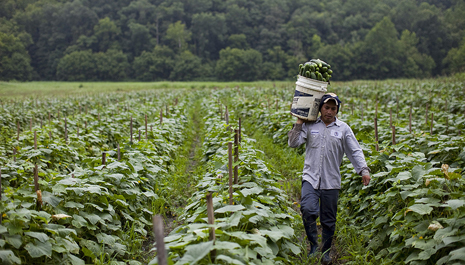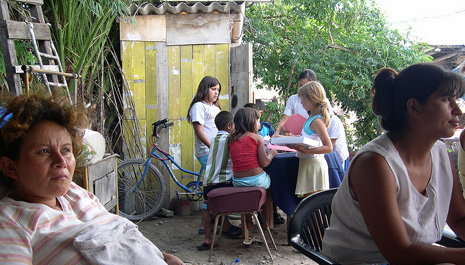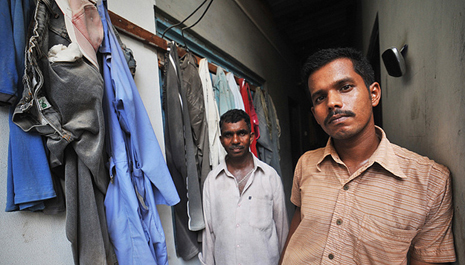Health
(Research papers and policy briefs below)
Health and access to health care for all migrants are fundamental issues for migration policy. All persons have rights and need for health care and well-being. This fundamental principal is not only a matter of human rights and the rule of law. It is a fundamental public health policy challenge. Disease knows no borders; excluding anyone present in a given population or locality from access to preventative and curative health care is, simply put, a recipe for disaster. It is an issue of decent work, notably in assuring safety and health at the workplace, necessary in turn to reduce the high economic and social costs of accidents, injuries and sickness deriving from poor conditions of work - often especially poor where migrants are employed.
Health issues for migrant populations have long been acknowledged as public health concerns, although rarely addressed with adequate attention or resources. Increasing international mobility, and growing political and media attention to migration spotlight health dilemmas facing migrants. Many migrants living temporarily or permanently outside their countries of origin have restricted access - sometimes none at all - to public health services and health insurance. This is especially the plight of irregular or unauthorized migrants.
Public health risks posed by migrants with communicable diseases and untreated sicknesses or injuries have long been recognized. Less visible but of great concern are the multiple problems faced by migrant workers and families exposed to toxic substances, high risk of workplace injuries and unhealthy working conditions with little or no access to prevention and care. Migrants are typically asked to accept positions that local workers refuse and are frequently assigned to mining, construction, heavy manufacturing, and agricultural tasks that can expose them to a range of occupational risks, including toxic agents, long hours, and little if any protection in terms of clothing and hazardous equipment. Linguistic obstacles, poor communication, lack of familiarity with modern machinery, and different attitudes to safety are all factors that increase the work related risks. Migrant workers, in particular undocumented migrant workers, often tolerate dangerous conditions without protest for fear losing their jobs or being deported. Lack of familiarity with the country, the culture and the language also means that migrant workers are typically unaware of safety and health protections or their rights.
A World Health Assembly Resolution in 2009 and a first global conference on health and migrants organized by WHO and IOM in Madrid in 2010 highlighted the importance of health in migration on both public health and migration policy agendas. Data, research and policy advocacy are urgently required; GMPA associates are involved in research and policy advisory activities; we work with an emerging international network of practitioners and policy experts to expand and extend public health and occupational health and safety policy and practice to all migrants.
The Global COVID-19 Pandemic and Migration
The global situation has changed radically since March 2020. The global COVID-19 pandemic, its human consequences, generalized recession in 2020, and often ill-considered anti-coronavirus measures changed migration patterns –but did not reduce economic and development dependency on migration of skills and labour. While globalized travel bans, ‘stay in place’ confinement and work stoppage under the COVID-19 pandemic emergency meant that migrant workers everywhere were temporarily out of work –and some remain so-- renewed demand for foreign skills and labour has surged since mid 2021. Foreign workers appear to be needed now as much as ever in industries, services and health care. Nonetheless, increasing restrictions on immigration combined with difficult economic and employment situations in some primarily migrant worker-origin countries make for a “buyer’s market” with some labour demand-side countries proposing de-regulatory terms, while origin countries face economic and social pressures to offer workers for jobs abroad at any price –whatever the human costs.
Documents and Papers
- COVID-19, Migrants, Refugees, Mobile Workers: Global Assessment and Action Agenda. P.Taran & O.Kadysheva. (2022). Revista Tecnológica - Espol.
- Return and reintegration challenges and policy responses in Asia following the COVID-19 pandemic. P.Wickramasekara, ADBI – OECD – ILO, 2022.
- La Pandemia de Covid y Los Migrantes: una Agenda de Diez Puntos Para Mitigar el Desastre en Curso. P.Taran & N.Solorzano Alcivar (2021). Revista Compendium: Cuadernos de Economía y Administración.
- newly posted ! Coronavirus pandemic challenges migrants worldwide and in Russia. I.Ivakhnyuk, 2020.
- COVID-19 Pandemic and Migrant Workers in Malaysia and Singapore with Special Focus on South Asian Workers. P.Wickramasekara, 2020.
- Migrants and Migration under Covid-19: Demise of Solidarity, Failure of International Community. Briefing paper by P. Taran for GreyTalks, 16 June 2020.
- The International Community and Global Society: What Are Pandemics Changing? Expert Opinion by Patrick Taran. The Valdai Club. 3 June 2020.
- Migration-Health-HIV&AIDS Framework for Action Brief 2019
- Promoting a Rights-based Approach to Migration, Health, and HIV and AIDS: A Framework for Action. ILO, 2017. Researched and written by P.Taran with GMPA team.





